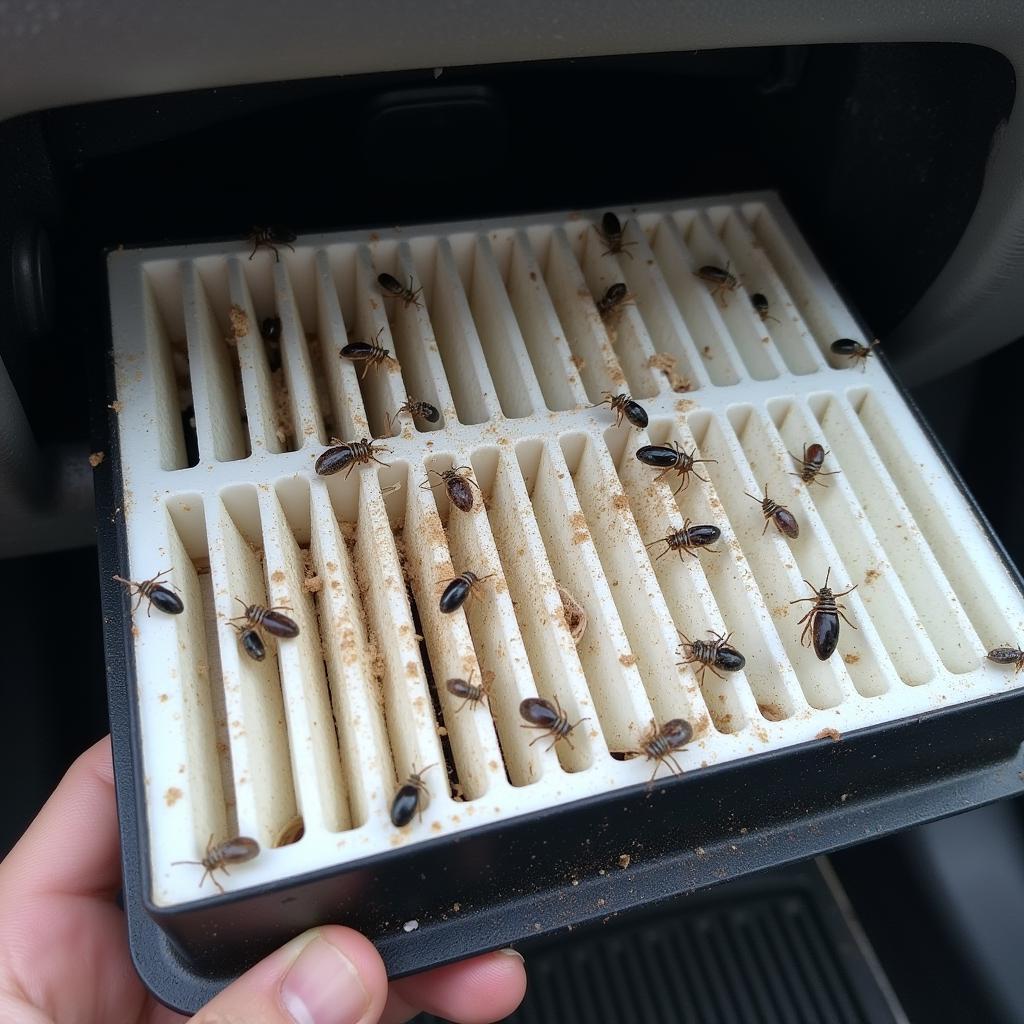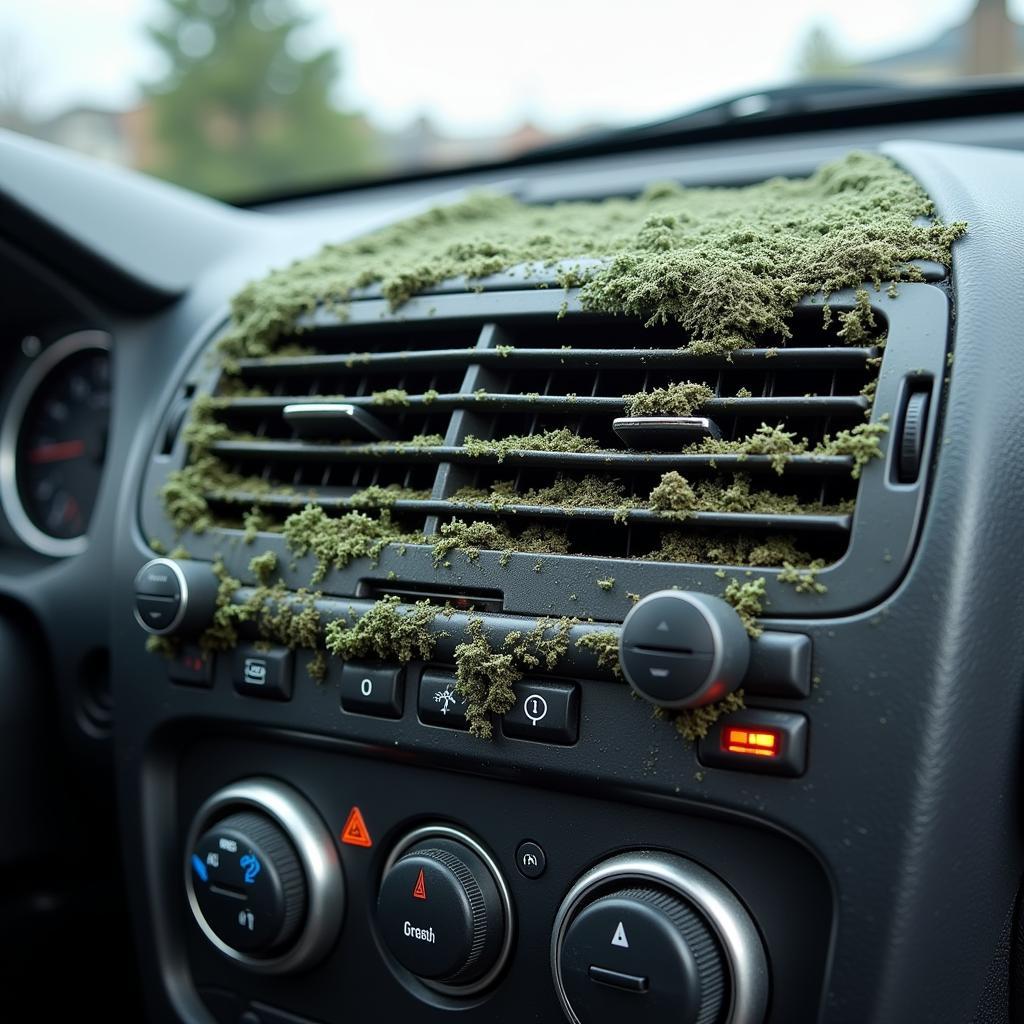Experiencing the sweltering heat inside your car due to a malfunctioning air conditioner? Don’t sweat it! This comprehensive guide will equip you with the knowledge to diagnose and potentially fix common car AC issues. We’ll explore the intricacies of your vehicle’s AC system, troubleshoot common problems, and provide step-by-step guidance on Air Conditioner Fix Car solutions.
Understanding Your Car’s Air Conditioning System
Before we dive into troubleshooting, it’s essential to grasp the basics of how your car’s AC system operates.
The system is a closed loop that uses refrigerant, a specialized fluid, to cool the air. It consists of several key components:
- Compressor: This component pressurizes and circulates the refrigerant throughout the system.
- Condenser: Located at the front of your vehicle, the condenser cools the refrigerant, changing it from a high-pressure gas to a high-pressure liquid.
- Receiver/Drier: This component filters out moisture and debris from the refrigerant.
- Expansion Valve: This valve regulates the flow of refrigerant into the evaporator.
- Evaporator: Positioned inside the dashboard, the evaporator absorbs heat from the cabin air, cooling it down.
Common Car AC Problems and Their Solutions
Let’s explore some frequent car AC problems and their potential solutions:
1. AC Blowing Hot Air
Possible Causes:
- Low Refrigerant: This is the most common cause. Leaks can develop in the system over time, leading to a loss of refrigerant.
- Faulty Compressor: A malfunctioning compressor won’t be able to circulate refrigerant effectively.
- Electrical Issues: A blown fuse, faulty relay, or wiring problems can disrupt the AC system’s power supply.
Troubleshooting and Solutions:
- Check Refrigerant Level: If your AC is low on refrigerant, you’ll need to recharge it. It’s recommended to have a professional mechanic handle this.
- Inspect the Compressor: Listen for any unusual noises coming from the compressor. If it’s not engaging or making grinding sounds, it might need replacement.
- Examine Electrical Components: Check the fuses, relays, and wiring associated with your AC system for any signs of damage or malfunction.
2. Weak Airflow
Possible Causes:
- Clogged Cabin Air Filter: A dirty filter restricts airflow into the cabin.
- Blocked Vents: Obstructions in the vents can hinder airflow.
- Blower Motor Issues: A failing blower motor won’t be able to generate sufficient airflow.
Troubleshooting and Solutions:
- Replace Cabin Air Filter: It’s recommended to replace your cabin air filter every 12,000 to 15,000 miles or as needed.
- Inspect and Clear Vents: Ensure all vents are open and free from any obstructions.
- Check Blower Motor: If you hear unusual noises or experience inconsistent fan speeds, the blower motor might need attention.
 Clogged Cabin Air Filter
Clogged Cabin Air Filter
3. AC System Cycling On and Off Rapidly
Possible Causes:
- Low Refrigerant: Insufficient refrigerant can cause the system to cycle on and off frequently.
- Faulty Expansion Valve: A malfunctioning expansion valve can disrupt the refrigerant flow, leading to erratic cycling.
- Electrical Problems: Wiring issues or a faulty control module can disrupt the system’s operation.
Troubleshooting and Solutions:
- Address Refrigerant Levels: Check and recharge refrigerant if necessary.
- Inspect Expansion Valve: Have a mechanic check the expansion valve for proper operation.
- Diagnose Electrical Issues: Examine the wiring and control module for any faults.
4. Foul Odor from the AC
Possible Causes:
- Mold or Mildew Growth: Moisture accumulation in the evaporator case can create a breeding ground for mold and mildew.
Troubleshooting and Solutions:
- Clean or Replace Evaporator: Cleaning or replacing a mold-infested evaporator is crucial to eliminate the odor. Consider using an anti-microbial treatment to prevent future growth.
 Moldy Car AC Evaporator
Moldy Car AC Evaporator
Tips for Maintaining Your Car’s AC System
Preventative maintenance is key to a well-functioning AC system:
- Regularly Recharge Refrigerant: Have your AC system inspected and recharged every 2-3 years or as recommended by your vehicle manufacturer.
- Run Your AC Periodically: Even during cooler months, run your AC for a few minutes every month to keep the system lubricated and prevent seals from drying out.
- Keep it Clean: Regularly clean the area around the condenser to ensure proper airflow.
Air Conditioner Fix Car: When to Call a Professional
While some AC issues can be addressed with DIY solutions, it’s essential to recognize when professional help is needed.
Consult a qualified mechanic if:
- You suspect a refrigerant leak.
- The compressor is faulty.
- You encounter complex electrical issues.
- You’re uncomfortable performing the repairs yourself.
 Car AC Repair Mechanic
Car AC Repair Mechanic
Conclusion
A properly functioning AC system is vital for a comfortable driving experience, especially during hot weather. Understanding the basics of your car’s AC, recognizing common problems, and knowing when to seek professional help empowers you to keep your cool on the road.
Remember, regular maintenance is key to preventing costly repairs down the line. By following the tips outlined in this guide, you can enjoy a refreshing and comfortable drive, no matter the temperature outside.
If you’re experiencing persistent car AC problems or prefer the expertise of certified technicians, don’t hesitate to contact us at Autotippro. We’re here to provide expert air conditioner fix car solutions tailored to your needs.
Contact AutoTipPro:
Phone: +1 (641) 206-8880
Office: 500 N St Mary’s St, San Antonio, TX 78205, United States
Frequently Asked Questions
1. How often should I recharge my car’s AC refrigerant?
It’s generally recommended to have your car’s AC system inspected and recharged every 2-3 years, but consult your owner’s manual for specific recommendations for your vehicle model.
2. Why does my car AC smell bad when I first turn it on?
A foul odor usually indicates mold or mildew growth in the evaporator case. This occurs due to moisture accumulation.
3. Can I add refrigerant to my car’s AC myself?
While DIY refrigerant recharge kits are available, it’s recommended to have a professional handle this task. Improper handling of refrigerant can be dangerous and environmentally harmful.
4. How can I tell if my car AC compressor is bad?
Signs of a failing compressor include loud noises (grinding, clicking), inconsistent cooling, and the AC clutch not engaging.
5. Why is my car AC blowing cold air on one side but hot air on the other?
This could indicate a blend door actuator malfunction. The blend door controls the mix of hot and cold air. A faulty actuator might not be able to position the door correctly.





Leave a Reply